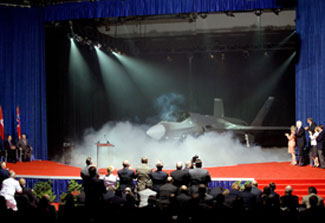| Home | Blog | Ask This | Showcase | Commentary | Comments | About Us | Contributors | Contact Us |

Is there a desirable jobs benefit from defense spending?ASK THIS | September 252, 2011'Overhead' -- not labor -- can take up the lion's share of spending on big-ticket military hardware, writes Winslow Wheeler. That makes spending money on defense a terribly inefficient way to create jobs. By Winslow Wheeler For years and years, advocates of big defense spending have argued that it brings with it a major economic benefit: Jobs. These claims are ever more strident now because of high unemployment and the threats to further growth in the defense budget. Hearing the footsteps on the unaffordable, underperforming F-35, Lockheed, among others, touts the jobs they pretend the program creates. The defense budget does create jobs, but it is highly inefficient at it. Large portions of the total defense budget are spent on things that have nothing to do with jobs in the U.S.; even the procurement and R&D accounts (i.e. the portions that porkers in and out of Congress claim to be U.S.-jobs-rich) are terrible investments for employment.
In 2007, the University of Massachusetts at Amherst published a study on the matter. The study was updated in 2009. William Hartung, the author of an excellent history of the Lockheed Corporation ("Prophets of War"), has written a concise summary for the Center for International Policy. He concludes that more defense spending will actually result in a net loss of U.S. jobs.
In Bill Hartung's summary, note the anecdotal data about the F-35: Even according to Lockheed, 85% of the spending for the program is for overhead; according to the program's chief advocate in the Defense Department, Ashton Carter, just 1.5% of program funding is for labor at the program's primary plant in Fort Worth. These assertions -- revealing as they are -- come from the advocates and may be -- shall we say -- incomplete; they would make an excellent subject for an audit -- a jobs audit -- by an objective and competent authority, such as the Government Accountability Office.
That no such audit is available is just another "bi-product" of the bi-partisan nature of Congress' pork system: both Democrats and Republicans love to pretend they are bringing home the bacon in the form of jobs with local defense spending. But that's not necessarily so. In 1998, I asked GAO to study the economic impact of defense spending on the State of New Mexico (I worked for Senator Pete Domenici, R-NM, at the time). The GAO found that the number of jobs that DOD contractors created in New Mexico from procurement and R&D spending there was absolutely puny. Unfortunately, however, knowing how weak DOD contractor spending was at creating jobs in New Mexico did nothing to slow down Senator Domenici's all-consuming aggressiveness in chasing down every single morsel of DOD pork he could find.
The jobs argument is one of many that big DOD spenders in Congress, industry and think tanks will tout as they oppose reductions in the Pentagon budget this fall. In doing so, they will throw around impressive numbers -- conveniently provided by contractors, not by independent researchers. Contrary evidence, like the University of Massachusetts study and Hartung's summary will be studiously ignored, but that's a prime characteristic of a system, like Congress, where convenient myth is valued far more highly than awkward data.
|




